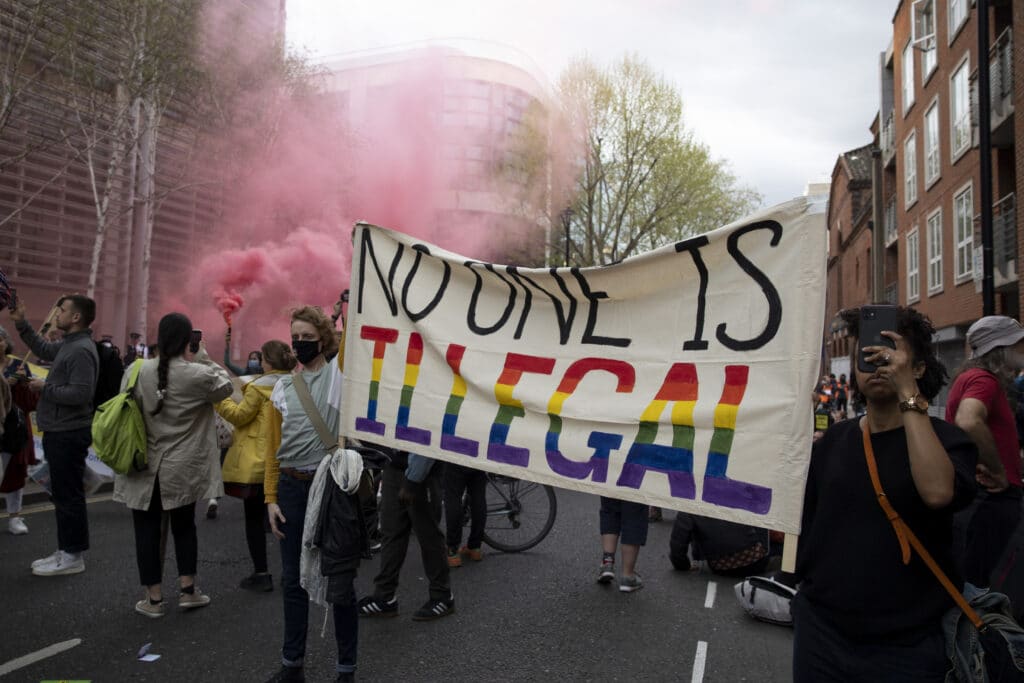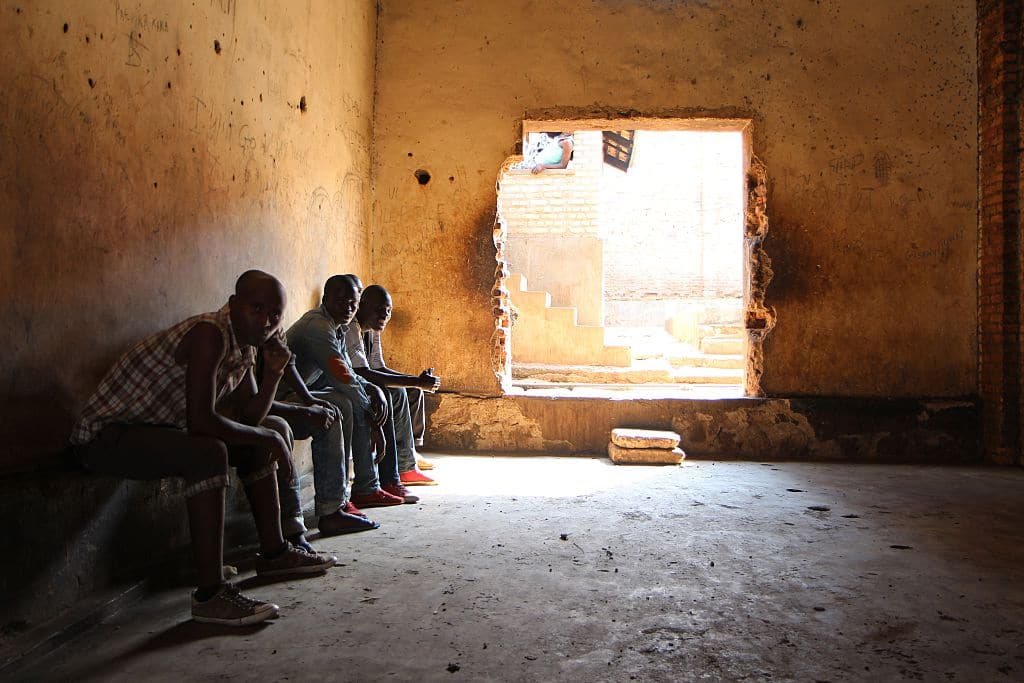JOSH MILTON APRIL 28, 2022
PINK NEWS

Government plans to tighten immigration rules have been met with fierce criticism.

Government plans to tighten immigration rules have been met with fierce criticism.
(Hesther Ng/SOPA Images/LightRocket via Getty Images)
The UK government’s overhaul of the immigration system through the Nationality and Borders Bill has been passed by parliament in a move that will imperil LGBT+ asylum seekers.
Home secretary Priti Patel’s reviled borders bill will toughen Britain’s already hawkish immigration process and criminalise entering the country without a valid visa or through what the government calls “irregular routes”, such as by boat.
In other words, it will legalise even more ways to criminalise or block altogether asylum seekers entering Britain, LGBT+ and refugee welfare groups told PinkNews.
With parliament being suspended – or prorogued – on Thursday (28 April), MPs and peers scrambled to ensure the bill passed on Wednesday night.
If lawmakers had not, the legislation may have been scrapped altogether. The bill will become law once it receives royal assent.
In a “factsheet“, the Home Office touted the Nationality and Borders Bill as a way “fix Britain’s broken asylum system” and tackle people smuggling by deterring so-called “illegal entry”.
Though, the number of overall asylum applications last year was far lower than its peak nearly two decades ago. The total in 2021 was a little more than half of what it was in 2002.
Even from the onset the Nationality and Borders Bill drew backlash. The United Nations’ refugee agency said the law would undermine Britain’s commitment to the 1951 UN convention on refugees.
The UK government’s overhaul of the immigration system through the Nationality and Borders Bill has been passed by parliament in a move that will imperil LGBT+ asylum seekers.
Home secretary Priti Patel’s reviled borders bill will toughen Britain’s already hawkish immigration process and criminalise entering the country without a valid visa or through what the government calls “irregular routes”, such as by boat.
In other words, it will legalise even more ways to criminalise or block altogether asylum seekers entering Britain, LGBT+ and refugee welfare groups told PinkNews.
With parliament being suspended – or prorogued – on Thursday (28 April), MPs and peers scrambled to ensure the bill passed on Wednesday night.
If lawmakers had not, the legislation may have been scrapped altogether. The bill will become law once it receives royal assent.
In a “factsheet“, the Home Office touted the Nationality and Borders Bill as a way “fix Britain’s broken asylum system” and tackle people smuggling by deterring so-called “illegal entry”.
Though, the number of overall asylum applications last year was far lower than its peak nearly two decades ago. The total in 2021 was a little more than half of what it was in 2002.
Even from the onset the Nationality and Borders Bill drew backlash. The United Nations’ refugee agency said the law would undermine Britain’s commitment to the 1951 UN convention on refugees.

Home Secretary Priti Patel has sought to toughen Britain’s already hardline immigration rules with the Nationality and Borders Bill.
(PAUL ELLIS/AFP via Getty Images)
Among other critics of the bill, nearly 250 top human rights organisations have signed a pledge urging for the law to be repealed. These include LGBT+ groups such as Stonewall and Mermaids.
Another signatory includes Safe Passage International, a campaign group that lobbies for more accessible, legal routes to Britain for child refugees.
“Refugees who have escaped war and persecution, like Afghans fleeing Taliban, will be denied safety and sanctuary,” the group’s CEO Beth Gardiner-Smith said in a statement to PinkNews.
Most of those fleeing from war-torn countries such as Syria and Yemen who arrived in Britain by boat had valid asylum claims, research has found. But not anymore – a refugee arriving by boat could face up to four years in prison, regardless of validity.
“As people open their homes to those fleeing the war in Ukraine, it’s disgraceful that the government is slamming the door shut on refugees with this bill,” she added.
Among other critics of the bill, nearly 250 top human rights organisations have signed a pledge urging for the law to be repealed. These include LGBT+ groups such as Stonewall and Mermaids.
Another signatory includes Safe Passage International, a campaign group that lobbies for more accessible, legal routes to Britain for child refugees.
“Refugees who have escaped war and persecution, like Afghans fleeing Taliban, will be denied safety and sanctuary,” the group’s CEO Beth Gardiner-Smith said in a statement to PinkNews.
Most of those fleeing from war-torn countries such as Syria and Yemen who arrived in Britain by boat had valid asylum claims, research has found. But not anymore – a refugee arriving by boat could face up to four years in prison, regardless of validity.
“As people open their homes to those fleeing the war in Ukraine, it’s disgraceful that the government is slamming the door shut on refugees with this bill,” she added.
‘Deplorable’ Borders Bill will have a ‘grievous impact’ on LGBT+ asylum seekers
For LGBT+ people fleeing persecution and violence, in particular, the bill will throw many into jeopardy.
Rainbow Migration, a charity that supports LGBT+ people seeking asylum, told PinkNews that regardless of the validity of their claim for safe haven, many queer asylum seekers face unconcern from the Home Office.
“It is deplorable that this harmful bill has passed,” a Rainbow Migration spokesperson said.
“There will be a grievous impact on LGBTQI+ people who have sought safety in the UK. They face being disbelieved about their sexual orientation or gender identity to a greater extent than now.”
Indeed, the bill is about to make what is already an invasive and exhaustive process so much worse.
By increasing the burden of proof needed for queer asylum seekers and making them disclose their identity on arrival, some may simply not have the language to immediately describe their gender identity or sexual orientation to officials.
The Home Office currently refuses four out of five LGBT+ claims. When deciding whether an LGBT+ person is who they say they are, officials are understood to often rely on demeaning stereotypes
.

Prime minister Boris Johnson (C) has said the navy would take over patrolling the Channel for migrants trying to cross from France.
(DAN KITWOOD/POOL/AFP via Getty Images)
“If they manage to be successfully recognised as refugees, they will be left in limbo for 10 years before they can gain the right to stay in the UK permanently,” the spokesperson added.
Sabir Zazai, chair of refugee group coalition Together With Refugees and himself a refugee, said that the measure will prove not only costly for the government but do little to achieve its aims of tackling people-smuggling.
In fact, he said, it will increase the number of LGBT+ asylum seekers resorting to the dangerous practice – an outcome that LGBT+ refugees themselves warned last year would happen to PinkNews.
“This is a devastating blow to LGBTQ+ people forced to find safety in the UK,” Zazai said.
“I arrived here in the back of a lorry from Afghanistan more than 20 years ago, now anyone doing the same could face imprisonment in the UK. Yet two-thirds of the population think we should welcome refugees.
“It is very clear that this bill does not reflect who we are as a nation.”
“If they manage to be successfully recognised as refugees, they will be left in limbo for 10 years before they can gain the right to stay in the UK permanently,” the spokesperson added.
Sabir Zazai, chair of refugee group coalition Together With Refugees and himself a refugee, said that the measure will prove not only costly for the government but do little to achieve its aims of tackling people-smuggling.
In fact, he said, it will increase the number of LGBT+ asylum seekers resorting to the dangerous practice – an outcome that LGBT+ refugees themselves warned last year would happen to PinkNews.
“This is a devastating blow to LGBTQ+ people forced to find safety in the UK,” Zazai said.
“I arrived here in the back of a lorry from Afghanistan more than 20 years ago, now anyone doing the same could face imprisonment in the UK. Yet two-thirds of the population think we should welcome refugees.
“It is very clear that this bill does not reflect who we are as a nation.”
LGBT+ asylum seekers ‘offshored’ to Rwanda face an ‘uncertain future’
The problems do not end there, however. The bill passing all but paves the way for the government to push through with its plans to ‘offshore‘ some asylum seekers to processing centres in Rwanda.
While full details of the migration partnership with the central African nation have yet to be released, it immediately raised alarms with LGBT+ groups and legal experts, concerned that queer people will be “deported to their deaths“.
Forcibly resettling refugees, Refugee Migration added, will make it even “easier for the government to not even consider people’s asylum claims”.

Rwandans sit in the Gikondo Transit Center in 2015. (Getty)
LGBT+ claimants will likely face “an uncertain future in Rwanda”, they said. While same-sex relations are not illegal in Rwanda, LGBT+ people have described facing bogus arrests and hiding who they are to avoid violence and hardship.
Members of one LGBT+ Rwandan campaign group, who spoke on the condition of anonymity for their safety, told PinkNews that British ministers have strived to present Rwanda as a “safe” place.
But “from experience”, they said, it’s anything but.
“It is neither safe nor good for us,” they said.” They expressed concern that those being deported to Rwanda will likely face harassment from processing centre officials, among other services, who hold “homophobic and conservative attitudes”.
Striking a hopeful tone, the members said that if any LGBT+ people are offshored to Rwanda, they will be waiting for them with open arms.
“We hope and look forward to working with them to protect LGBT+ rights,” they said.
LGBT+ claimants will likely face “an uncertain future in Rwanda”, they said. While same-sex relations are not illegal in Rwanda, LGBT+ people have described facing bogus arrests and hiding who they are to avoid violence and hardship.
Members of one LGBT+ Rwandan campaign group, who spoke on the condition of anonymity for their safety, told PinkNews that British ministers have strived to present Rwanda as a “safe” place.
But “from experience”, they said, it’s anything but.
“It is neither safe nor good for us,” they said.” They expressed concern that those being deported to Rwanda will likely face harassment from processing centre officials, among other services, who hold “homophobic and conservative attitudes”.
Striking a hopeful tone, the members said that if any LGBT+ people are offshored to Rwanda, they will be waiting for them with open arms.
“We hope and look forward to working with them to protect LGBT+ rights,” they said.
No comments:
Post a Comment